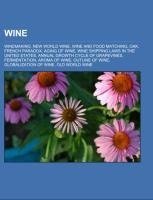
-
 Anglický jazyk
Anglický jazyk
Wine
Autor: Source: Wikipedia
Source: Wikipedia. Pages: 55. Chapters: Winemaking, New World wine, Wine and food matching, Oak, French Paradox, Aging of wine, Wine shipping laws in the United States, Annual growth cycle of grapevines, Fermentation, Aroma of wine, Outline of wine, Globalization... Viac o knihe
Na objednávku, dodanie 2-4 týždne
16.92 €
bežná cena: 18.80 €
O knihe
Source: Wikipedia. Pages: 55. Chapters: Winemaking, New World wine, Wine and food matching, Oak, French Paradox, Aging of wine, Wine shipping laws in the United States, Annual growth cycle of grapevines, Fermentation, Aroma of wine, Outline of wine, Globalization of wine, Old World wine, Wine rating, Organic wine, Harvest, 2006 Russian ban of Moldovan and Georgian wines, Wine humour, Domaine du Closel - Château des Vaults, Wine bar, List of wine-producing countries, In vino veritas, Co-fermentation, Coca wine, La Paulée de Meursault, Coates Law of Maturity, Government Hospitality Advisory Committee for the Purchase of Wine, Colambre, Vinogel, Bernache. Excerpt: Wine is an alcoholic beverage, made of fermented fruit juice, usually from grapes. The natural chemical balance of grapes lets them ferment without the addition of sugars, acids, enzymes, or other nutrients. Grape wine is produced by fermenting crushed grapes using various types of yeast. Yeast consumes the sugars in the grapes and converts them into alcohol. Different varieties of grapes and strains of yeasts produce different types of wine. Wines made from other fruits, such as apples and berries, are normally named after the fruit from which they are produced (for example, apple wine or elderberry wine) and are generically called fruit wine or country wine (not to be confused with the French term vin de pays). Others, such as barley wine and rice wine (i.e., sake), are made from starch-based materials and resemble beer and spirit more than wine, while ginger wine is fortified with brandy. In these cases, the term "wine" refers to the higher alcohol content rather than the production process. The commercial use of the English word "wine" (and its equivalent in other languages) is protected by law in many jurisdictions. Wine has a rich history dating back thousands of years, with the earliest known production occurring around 8,000 years ago on the territory of modern-day Georgia. It first appeared in the Balkans at about 4500 BC and was very common in ancient Greece, Thrace and Rome. Wine has also played an important role in religion throughout history. The Greek god Dionysus and the Roman equivalent Bacchus represented wine, and the drink is also used in Christian Eucharist ceremonies and the Jewish Kiddush. The English word "wine" comes from the Proto-Germanic "*winam," an early borrowing from the Latin vinum, "wine" or "(grape) vine," itself derived from the Proto-Indo-European stem *win-o- (cf. Hittite: wiyana, Lycian: Oino, Ancient Greek - oînos, Aeolic Greek - woinos). The earliest attested terms referring to wine are the Mycenaean Greek me-tu-wo ne-wo meani
- Vydavateľstvo: Books LLC, Reference Series
- Rok vydania: 2014
- Formát: Paperback
- Rozmer: 246 x 189 mm
- Jazyk: Anglický jazyk
- ISBN: 9781157464143








 Nemecký jazyk
Nemecký jazyk 

 Španielsky jazyk
Španielsky jazyk 

